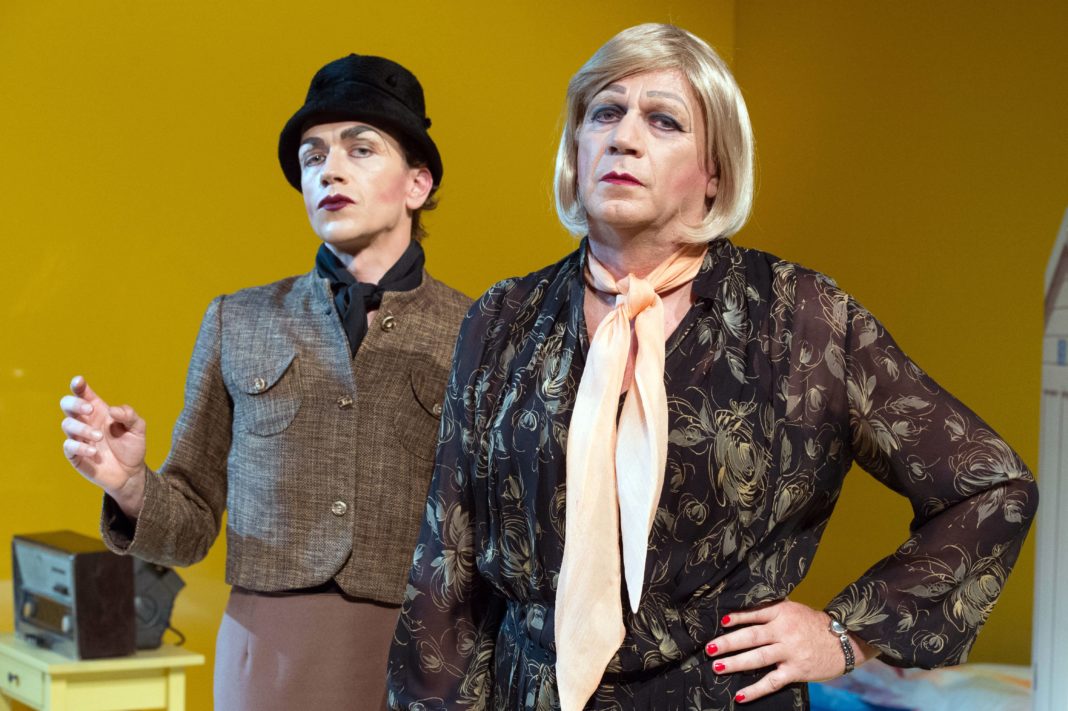Non ci uniamo al coro della retorica nella giornata in cui si celebra la festa della donna. Suggeriamo niente mimose per lettrici e lettori che potrebbero comprarle alle loro compagne, mogli, fidanzate, sorelle, mamme: ricordiamo invece due appuntamenti teatrali che rendono omaggio alla femminilità in modo diverso. Un’occasione per riflettere sulla differenza di genere e la capacità di combattere barriere mentali che sembrano d’acciaio.
Da oggi, giovedì 8 fino a domenica 17 marzo Geppy Gleijeses e Lorenzo Gleijeses portano in scena al teatro Sannazaro di Napoli Le cinque rose di Jennifer dell’indimenticabile Annibale Ruccello. A curarne la regia lo stesso Geppy Gleijeses per una produzione Gitiesse Artisti Riuniti.
Jennifer è un giovane femminiello che vive in uno squallido monolocale nel fantomatico Rione dei Travestiti di Napoli. Jennifer aspetta una telefonata da Franco, un ingegnere genovese attualmente a Milano per lavoro, che gli ha promesso di chiamarlo non appena tornerà in città; il telefono di Jennifer, per un disguido, intercetta tutte le chiamate del quartiere.
Con pazienza e amorevolezza il femminiello trascorre la giornata rispondendo a tutte le chiamate, preparandosi all’arrivo di Franco e ascoltando la stazione radiofonica Radio Cuore, che trasmette le canzoni delle sue artiste preferite, Mina, Ornella Vanoni e Patty Pravo.
Le trasmissioni sono spesso interrotte dalle notizie a proposito di uno spietato killer che sta mietendo vittime nel Rione dei Travestiti, il quale compone i corpi adornandoli di cinque rose rosse: questo non sembra preoccupare Jennifer, così come le telefonate di un importuno stalker che si finge Franco e che lei liquida con ironia.
Spiega Geppy Gleijeses: «Il travestito, ne ho frequentati tanti e negli anni in cui Annibale scrisse “Jennifer” (fu portata in scena per la prima volta a Napoli nel dicembre 1980 ndr) sono stato amico di alcuni, recita la condizione femminile in ogni senso, comportamentale e fisico, è una creatura di confine, “figura deportata” come definisce Ruccello i suoi personaggi, non è un transessuale, non ha fatto il grande salto, vive la sua condizione generalmente in modo doloroso e comunque iperbolico, toccando gli estremi della depressione e dell’euforia, creatura meravigliosa, fragile, delicatissima, a volte violenta ma sempre emarginata».
Sabato 9 marzo, invece alle 21, all’Auditorium Marillac, in via Andrea d’Isernia 23, andrà in scena “Nannarella 5.0 – Napoli e Roma nel dopoguerra”. Uno spettacolo dedicato ad Anna Magnani con Patrizio Rispo, Raffaella Ambrosino, Stefano Sannino e Carlo Berton al pianoforte. La regiaè a cura di Raffaella Ambrosino e la produzione di Maria Malibran.
Pensare oggi ad Anna Magnani, dopo 50 anni dalla sua morte, significa innanzitutto confrontarsi con un’artista unica. La sua forza caratteriale, il suo volto come espressione della sua grande personalità erano in grado di esprimere passioni enormi, montagne di sentimenti in chiave popolare. Ad Hollywood si diceva che, paragonate a lei, tutte le altre attrici sembravano di plastica per quanto fosse vera. E non gli rimase che premiarla per la sua arte, come prima attrice e artista italiana, con l’Oscar.
La sua storia è un pezzo di storia d’Italia, l’immediato dopoguerra; quelle storie così ben raccontate nei film “neorealisti”, dove la voglia di ricominciare a vivere era la molla di tutto.
Lo spettacolo vuole iniziare da qui, da questa voglia di rinascere. Perché è anche la nostra, quella stessa voglia, nonostante i danni prodotti da emergenze sanitarie e guerre, di ricominciare ad essere una comunità, a sentirci parte di una nazione che già in passato ha dato prova di grandi capacità di sacrificio e di senso civico e che ancora oggi desidera lavorare per garantirsi un futuro dignitoso.
Il pubblico sarà accompagnato in un viaggio musicale dai toni intensi ed emozionanti per raccontare l’amore che la grande Anna aveva per le canzoni romane e anche per Napoli e i suoi classici. Le scene dello spettacolo ricordano i grandi momenti dei suoi film che l’hanno resa celebre in tutto il mondo; il palco si colora di toni nostalgici, dapprima dell’avanspettacolo e poi del cinema, non tralasciando il teatro e la lirica, che era la grande passione di Nannarella.
Tra le canzoni intonate “Tanto pé cantà”, “Quanto sei bella Roma”, “Geppina ragazza di fumo”, “Maruzzella”, “Ciccio formaggio”, “Munasterio ‘e Santa Chiara” e “Malafemmena”. (Info e prenotazioni 366 3188501 – tamtamcoop@libero.it)

i Gleijeses in scena per Jennifer di Ruccello
We do not join the chorus of rhetoric when the entire world celebrates Women’s Day. No mimosas for our readers who might buy them for their partners, wives, girlfriends, sisters, mothers; instead, let us recall two theatrical events that pay tribute to femininity in a different way. An opportunity to reflect on gender difference and the ability to fight mental barriers that seem steely.
From today, March 8th, until Sunday, March 17th, Geppy Gleijeses and Lorenzo Gleijeses bring to the stage at the Sannazaro Theater in Naples Le cinque rose di Jennifer by the unforgettable Annibale Ruccello. Directed by Geppy Gleijeses himself for a Gitiesse Artisti Riuniti production.
Jennifer is a young femminiello who lives in a squalid one-room apartment in Naples’ fictional Rione dei Travestiti. Jennifer is waiting for a phone call from Franco, an engineer from Genoa who is currently on a business trip in Milan. He has promised to call her as soon as he returns to the city. However, Jennifer’s phone intercepts all the calls in the neighborhood, due to a glitch.
Patiently and lovingly, she spends the day answering all the calls, preparing for Franco’s arrival, and listening to the radio station Radio Cuore, which plays songs by her favorite artists: Mina, Ornella Vanoni, and Patty Pravo.
The broadcasts are often interrupted by news stories about a ruthless killer who is targeting victims in the Transvestite Neighborhood, and who arranges their bodies with five red roses. This doesn’t seem to bother Jennifer, nor do the phone calls from a persistent stalker pretending to be Franco. She dismisses them with irony.
Geppy Gleijeses explains. “The transvestite, I have been around many, and during the years when Hannibal wrote “Jennifer” (it was first brought to the stage in Naples in December 1980 ed. I was friends with someone who recites the female condition in every sense, both behavioral and physical. She is a boundary creature, a “deported figure” as Ruccello defines her characters. She is not a transsexual and has not made the big leap. She generally lives her condition in a painful and hyperbolic way, touching the extremes of depression and euphoria. She is a wonderful creature, fragile and delicate, sometimes violent but always marginalized.”
Instead, on Saturday, March 9th, at 9 p.m., the Marillac Auditorium, 23 Andrea d’Isernia St., will stage “Nannarella 5.0 – Naples and Rome in the postwar period.” A show dedicated to Anna Magnani with Patrizio Rispo, Raffaella Ambrosino, Stefano Sannino, and Carlo Berton on piano. It is directed by Raffaella Ambrosino and produced by Maria Malibran.
To think of Anna Magnani today, 50 years after her death, means first of all to confront a unique artist. Her strength of character, her face as an expression of her great personality, were able to express enormous passions, mountains of emotions in a popular key. It was said in Hollywood that compared to her, all the other actresses looked plastic because of how authentic she was. And they had no choice but to reward her for her art, as the first Italian actress and artist, with an Oscar.
Her story is a piece of the history of Italy, the immediate post-war period; those stories so well told in the “neorealist” films, where the desire to start living again was the main spring of everything.
The show wants to start from here, from this desire to be reborn. Because it is also ours, that same desire, despite the damage produced by health emergencies and wars, to begin again to be a community, to feel part of a nation that already in the past has shown great capacity for sacrifice and civic sense and still wants to work to ensure a decent future.
The audience will be taken on a musical journey with intense and emotional tones to recount the love that the great Anna had for Roman songs, as well as for Naples and its classics. The scenes of the show recall the great moments of her films that made her famous worldwide. The stage is colored with nostalgic tones, starting with the avant-garde and then transitioning to cinema, without neglecting theater and opera, which were Nannarella’s great passion.
Among the songs sung are “Tanto pé cantà,” “Quanto sei bella Roma,” “Geppina ragazza di fumo,” “Maruzzella,” “Ciccio formaggio,” “Munasterio ‘e Santa Chiara” and “Malafemmena.” (Info and reservations 366 3188501 – tamtamcoop@libero.it)










